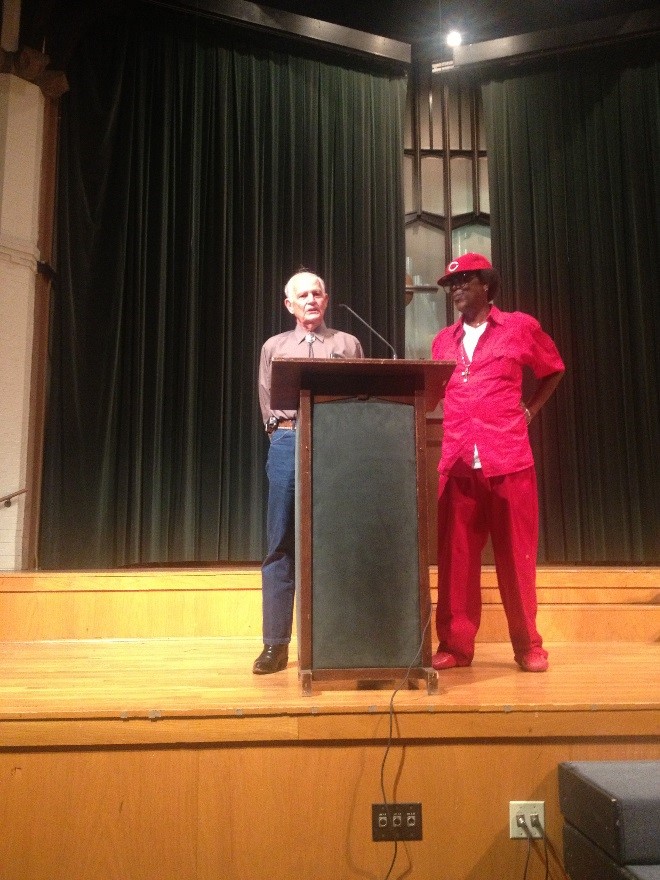
By: Kelsey Reno, Juris Op-Ed Honorable Mention
In my life I have had the honor to meet two exceptional men who have overcame great adversity in their lives. Although these two men faced horrors that would leave many bitter, and angry with the world these two have chosen to take their story and use it to inspire and educate others. Dale Johnston was wrongfully convicted of the murder of his step-daughter and her boyfriend in 1984. His conviction was overturned in 1988, and he was released in 1990, when the state dropped all charges.[1] Derrick Jamison was wrongfully convicted of murdering a bar tender in 1985. His conviction was overturned in 2002 and he was released in 2005.[2] Collectively these men spent 26 years on Ohio’s death row for crimes they did not commit. They are only two of the 151 exonerated that have fallen victim to an imperfect system.
The cost associated with seeking the death penalty against a person is extremely high. Terence Inch, former police commissioner of Hellam Township, PA, recently stated that “Pennsylvania has spent upwards of $350 million dollars on a death penalty system that has produced just three executions since 1999.”[3] A study completed by Seattle University recently found that seeking the death penalty in the state of Washington added approximately $1.15 million dollars in cost to the case.[4] This cost does not only stem from the post-conviction appeals necessary with a death sentence but heightened cost along every step of the process. The heightened cost associated with those cases could be put to better use elsewhere in our system.
There has been a growing movement to stop executions in the U.S. Many states have put executions to a halt for the time being. Some are pending a ruling from the U.S. Supreme Court about the drugs used in lethal injections, while others are reexamining the entire system. Governor Tom Wolf, of Pennsylvania, earlier this year placed a moratorium on executions in the state of Pennsylvania awaiting the completion of a study about the state’s system. Other states are abolishing the death penalty altogether, such as Maryland, who in 2013 joined 16 other states, and the District of Columbia, without the death penalty.
Innocent people are convicted from faulty police procedures, flawed witness testimony, spotty science, lackluster representation, or just a generally over-burdened and over-stressed system. These various problems do not stem from one source and therefore cannot be fixed with one solution. Just 20 years ago the field of fire investigation was largely unregulated. Most fire investigators believed that the natural process of backdraft[5] was actually signs of the use of an accelerant in a fire. The capability and ease of DNA testing is growing every year. This has led to an immense number of exonerations. With this imperfect system mistakes are made, and it costs innocent lives. There should be no reason and no excuse why the state should be allowed to kill innocent citizens.
It is time for our system, as a whole, to take a step towards justice and end the death penalty. Our country was founded on the principle of justice, there can be no justice when an imperfect system leads to the death of innocent citizens by the state.
[1] For more information on Dale Johnston’s story please see Witness to Innocence’s website, http://www.witnesstoinnocence.org/exonerees/dale-johnston.html.
[2] For more information on Derrick Jamison’s story please see Witness to Innocence’s website, http://www.witnesstoinnocence.org/exonerees/derrick-jamison.html.
[3] Terence Inch, Take it from an ex-cop death penalty is as fallible as the humans who carry it out, The Patriot News, Mar. 02, 2015, http://www.pennlive.com/opinion/2015/03/take_it_from_an_ex-cop_the_dea.html.
[4] Peter A. Collins et al., An Analysis of the Economic Cost of Seeking the Death Penalty in Washington State. Seattle University, Jan. 01, 2015, http://www.law.seattleu.edu/Documents/korematsu/deathpenalty/ The_Economic_Costs_of_Seeking_the_Death_Penalty_in_WA_FINAL.pdf.
[5] Backdraft occurs when fire travels to seek oxygen. This occurs when windows break, or doors are opened, typically leaving burn paths towards those windows or doors.
Kelsey’s article was selected as the Honorable Mention of the Third Annual Juris Magazine Op-Ed Writing Competition. The other submissions can be viewed on the Juris Blog at www.sites.law.duq.edu/juris.